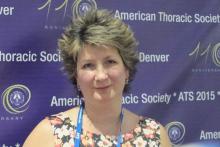DENVER – Men with previously undiagnosed severe obstructive sleep apnea and excessive daytime sleepiness have a more than four-fold increase in the risk of depression, compared with those without either condition, according to findings from a population-based cohort study.
Those with both severe obstructive sleep apnea (OSA) and excessive daytime sleepiness (EDS) also have a 3.5 times greater risk of depression than do those with either OSA or EDS alone, Carol Lang, Ph.D., reported during a press briefing at an international conference of the American Thoracic Society.
The findings have important implications for clinicians treating patients with depression; clinicians should recognize the risk of OSA in men with depression, and should screen those presenting with OSA – regardless of whether sleepiness is present, said Dr. Lang of the University of Adelaide, Australia.
Study subjects were 1,875 community dwelling Australian men aged 35-83 years who were assessed for depression using the Beck Depression Inventory/Centre for Epidemiological Studies Depression Scale (CES-D) at two times points about 5 years apart. A random sample of 857 men without previously diagnosed OSA underwent at-home polysomnography and completed the Epworth Sleepiness Scale questionnaire, and 1,660 men without depression at baseline were included in the analysis of incident depression.
Previously undiagnosed mild-to-moderate and severe OSA were associated with depression prevalence (adjusted odds ratio 2.1), and this was true even after adjusting for confounders and EDS.
EDS also was associated with depression (adjusted OR, 1.1). she said.
Patients with previously undiagnosed OSA and EDS had greater odds of depression than did those without OSA and EDS (OR, 4.2), and had greater odds of depression than did those with either condition alone (OR, 3.5).
Further, previously diagnosed OSA and previously undiagnosed severe OSA at follow-up were significantly associated with depression onset over a 5-year period (OR, 2.1 and 2.9, respectively), Dr. Lang said.
The findings support those of prior studies that have demonstrated a link between sleep apnea and depression.
As many as 22% of those with OSA also have clinically significant depressive symptoms, compared with 5% of the general population. Daytime sleepiness can occur in those with OSA, but not everyone with OSA reports daytime sleepiness, she said, noting that few prior studies have looked at the relationship between OSA and depression in a community-based population.
“Our study, in a large community-based sample of men, confirms a strong relationship even after adjustment for a number of other potential risk factors,” she said.
The mechanisms underlying the association remain unclear, but it may be that many of the symptoms of and risk factors for OSA and depression overlap.
“Sleep apnea is also associated with lower oxygen levels in the body, and this causes a range of physiological consequences, including altered inflammatory responses, hormonal stimulation, as well as neurological changes in the brain that just happen to be in the same region of the brain that might actually impact depression, feelings of guilt, worthlessness, and suicidal tendencies,” she said.
The message to clinicians based on these findings is that patients who present with symptoms of either OSA or depression should be screened for both.
“Often, I think, when people present with depression, it’s easy to just assume the sleep problems are related to the depression itself ... but there may actually be benefit for the patient if both are investigated and treated,” she concluded.
Dr. Mihaela Teodorescu of the University of Wisconsin, Madison, who moderated the press conference, added that additional data exist to suggest that sleep apnea leads to “more severe, and actually refractory depression,” and further stressed that lack of awareness of the association can be harmful for patients.
“These people just get more antidepressants, including benzodiazepines, which are really detrimental for the obstructive sleep apnea pathogenesis, worsening depression. So it’s very important for the community to be aware about sleep apnea as a potential aggravator and contributor to depression,” she said.
Dr. Lang reported having no relevant financial disclosures.


